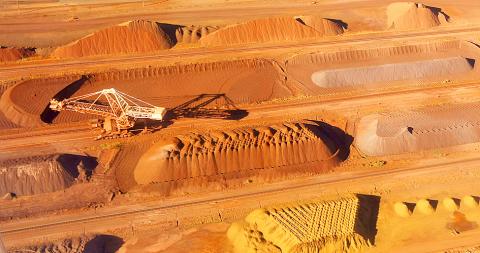BHP Billiton Ltd made a larger-than-expected cut to its dividend, lowering the payout for the first time in 15 years, as the world’s biggest mining company seeks to protect its balance sheet and credit ratings amid a price collapse that saw first-half profits tumble 92 percent.
Underlying profit fell to US$412 million at its continuing operations in the six months to Dec. 31, from US$4.9 billion a year earlier, Melbourne-based BHP said yesterday in a statement.
Its first-half dividend was cut to US$0.16 from US$0.62 a year earlier and the company said it will adopt a policy to provide payouts at a minimum of 50 percent of underlying attributable profit.

Photo: Reuters
The payout had been forecast to drop to US$0.31, according to Bloomberg data.
BHP warned in the statement that weaker prices and higher volatility across commodities markets are likely to persist for longer than the company had expected, prompting it to also cut its capital spending forecast and shake up top management.
“The company is doing everything in its power to protect its balance sheet and to ensure cashflows — despite this long period of price weakness,” Sydney-based Fat Prophets resource analyst David Lennox said by telephone. “The credit ratings houses will probably leave them where they are, primarily because they have done that hard work on the balance sheet.”
The big global miners are slashing dividends, cutting budgets and selling assets as pressure builds on them from investors and credit ratings companies to conserve cash to weather the commodities rout.
BHP, which paid out about US$6.5 billion in dividends in the year to June 30, had been urged to cut its policy to maintain or increase its payouts each year, in place since 2003, amid weaker prices.
The producer forecasts the crude oil market to rebalance in 2017 and copper to move to a structural deficit by the end of the decade, it said in a presentation.
Iron ore prices are likely to remain low on weak demand and abundant supply, BHP said.
BHP’s full-year dividend has not fallen since the 2001 merger between BHP Ltd and Billiton PLC that created the company.
Before then, the company last chose to cut its dividend in 1988, the company said in an e-mailed statement.
“Slower growth in China and the disruption of OPEC have resulted in lower prices than expected,” chief executive officer Andrew Mackenzie said in the statement.
Global growth is expected to pick up slightly this calendar year, but will remain modest and subject to ongoing financial markets volatility, the company said.
Capital expenditure in the year to June 30 will fall to US$7 billion, from an estimate in August of US$8.5 billion, while spending in fiscal 2017 will be cut to US$5 billion from the previous forecast of US$7 billion, the producer said.
BHP posted a US$5.7 billion net loss in the half, from a profit of US$4.3 billion a year earlier.
That compared to an average US$5.5 billion loss among three analyst estimates compiled by Bloomberg.
“It’s a deteriorating outlook, there’s no silver lining in this cloud,” Melbourne-based Pengana Capital Ltd portfolio manager Tim Schroeders, who helps oversee about US$1.2 billion in assets, including BHP shares, said by telephone. “The tone is more negative, and that’s appropriate.”

Meta Platforms Inc offered US$100 million bonuses to OpenAI employees in an unsuccessful bid to poach the ChatGPT maker’s talent and strengthen its own generative artificial intelligence (AI) teams, OpenAI CEO Sam Altman has said. Facebook’s parent company — a competitor of OpenAI — also offered “giant” annual salaries exceeding US$100 million to OpenAI staffers, Altman said in an interview on the Uncapped with Jack Altman podcast released on Tuesday. “It is crazy,” Sam Altman told his brother Jack in the interview. “I’m really happy that at least so far none of our best people have decided to take them

BYPASSING CHINA TARIFFS: In the first five months of this year, Foxconn sent US$4.4bn of iPhones to the US from India, compared with US$3.7bn in the whole of last year Nearly all the iPhones exported by Foxconn Technology Group (富士康科技集團) from India went to the US between March and last month, customs data showed, far above last year’s average of 50 percent and a clear sign of Apple Inc’s efforts to bypass high US tariffs imposed on China. The numbers, being reported by Reuters for the first time, show that Apple has realigned its India exports to almost exclusively serve the US market, when previously the devices were more widely distributed to nations including the Netherlands and the Czech Republic. During March to last month, Foxconn, known as Hon Hai Precision Industry

PLANS: MSI is also planning to upgrade its service center in the Netherlands Micro-Star International Co (MSI, 微星) yesterday said it plans to set up a server assembly line at its Poland service center this year at the earliest. The computer and peripherals manufacturer expects that the new server assembly line would shorten transportation times in shipments to European countries, a company spokesperson told the Taipei Times by telephone. MSI manufactures motherboards, graphics cards, notebook computers, servers, optical storage devices and communication devices. The company operates plants in Taiwan and China, and runs a global network of service centers. The company is also considering upgrading its service center in the Netherlands into a

Taiwan’s property market is entering a freeze, with mortgage activity across the nation’s six largest cities plummeting in the first quarter, H&B Realty Co (住商不動產) said yesterday, citing mounting pressure on housing demand amid tighter lending rules and regulatory curbs. Mortgage applications in Taipei, New Taipei City, Taoyuan, Taichung, Tainan and Kaohsiung totaled 28,078 from January to March, a sharp 36.3 percent decline from 44,082 in the same period last year, the nation’s largest real-estate brokerage by franchise said, citing data from the Joint Credit Information Center (JCIC, 聯徵中心). “The simultaneous decline across all six cities reflects just how drastically the market